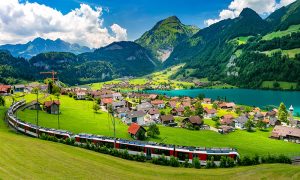New Zealand Skilled Migrants(The Skilled Migrant Category (SMC) is a place where many aspirantsimmigrantsNew Zealand's list of popular occupations and skills (Shortage Occupation List) was updated in 2024 to cover a number of high-demand areas. If you are planning to enter New Zealand through the SkilledImmigration to New Zealand, this guide will take you through the latest hot careers and how to match your skills.
I. New Zealandskilled migrantCore elements of the
1. skilled migrantscoring system
skilled migrantBased on a scoring system, applicants need to score enough points on the Expression of Interest (EOI) to be invited to submit a formal application. Scoring factors include:
- (a person's) age: 20-39 years of age add the most points, up to 30 points.
- education attainment: 70 additional points for a master's degree or higher, and 50 points for a bachelor's degree.
- working experience: Up to 50 points for 5+ years of experience in a related industry.
- New Zealand Job Offer: 50 additional points for having a valid employment offer from a New Zealand employer.
- Extra points for the list of shortage occupations: If the occupation is on the list, add an additional 10 points.
2. Minimum scoring requirements
From 2024, the minimum score for skilled migration has been increased to 180. This adjustment means that applicants will need to focus more on academic upgrading, skill relevance and work experience.
Analysis of New Zealand's Hot Occupations and Skills List
Every year, the New Zealand government updates the Skill Shortage Lists (Shortage Occupations), which are categorized into Long Term Shortage, Regional Shortage and Building Infrastructure categories. Below are the main hot areas for 2024:
1. IT and technology area
With the rapid development of the digital economy, IT-related jobs have long been at the top of the shortage list:
- Software Development Engineer(Software Developer)
- data scientist(Data Scientist)
- Network Security Specialist(Cybersecurity Specialist)
- Artificial Intelligence Engineer(AI Engineer)
These positions require a high level of education, programming skills, and real-world project experience, and applicants with industry certifications (e.g., AWS, Cisco, Microsoft) will be more competitive.
2. Medical and nursing field
The strain on healthcare resources has made healthcare professionals a hotspot for immigrants:
- registered nurse(Registered Nurse)
- general practitioner(General Practitioner)
- Mental Health Counselor(Mental Health Counselor)
Medical practitioners with relevant international certifications and licenses not only receive high ratings, but also enjoy fast-track approval.
3. Engineering and construction
New Zealand's infrastructure continues to expand and the following engineering jobs are in high demand:
- civil engineer(Civil Engineer)
- Structural Engineer(Structural Engineer)
- Construction Project Manager(Construction Project Manager)
These careers require applicants to have a professional degree and years of project experience, and familiarity with New Zealand's building standards will be a plus.
4. Education
There is a chronic shortage of teachers in the field of education, especially in early childhood and special education:
- Early Childhood Education Teachers(Early Childhood Teacher)
- Special education teachers(Special Education Teacher)
Applicants with relevant teaching qualifications and experience in the New Zealand education industry are usually more likely to be approved.

5. Renewable energy sector
As the world transitions to green energy, the following positions have been added in New Zealand:
- Wind power technician(Wind Turbine Technician)
- Solar Engineer(Solar Engineer)
- Environmental consultant(Environmental Consultant)
These positions require applicants to have a specialized technical background, particularly practical experience in renewable energy projects.
III. How to Match Your Skills and Shortage Occupations
1. Analyze your own background
Carefully review the list of shortage occupations and choose an eligible occupation taking into account your education, professional experience and interests.
2. Upgrade relevant qualifications
If your career is not on the list, but has the potential for transformation, consider bridging the gap by:
- Obtain professional certification related to shortage occupations.
- Enroll in a New Zealand qualification enhancement course to obtain a locally recognized qualification.
3. Find Jobs in New Zealand
Proactively searching for job opportunities related to shortage occupations through job boards (e.g. Seek, Indeed) and employment agencies can significantly improve ratings after obtaining an Offer.

4. Utilization of the services of immigration consultants
Professional immigration consultants have in-depth knowledge of career matching and score optimization, and they can help you find the most suitable immigration path.
Application Process of New Zealand Skilled Migration
Below are the main steps of a skilled migration application:
1. Submit an Expression of Interest (EOI)
Fill out the EOI form with information about your education, work experience, and language scores to ensure a score of 180 or higher.
2. Wait for an invitation
New Zealand immigrationThe Bureau issues Invitation to Apply (ITA) letters to applicants whose scores qualify for the program on a monthly basis.
3. Preparation of materials
Upon receipt of the ITA, you will be required to submit documents including proof of academic qualifications, proof of employment, language scores, a medical report and a clean record.
4. Visa processing
The USCIS will review the application materials, which usually takes 6-9 months.
5. Obtaining a visa
Once your visa is approved, you can travel to New Zealand to start a new life.
V. Key Skills for Successful Skilled Migration
- Prioritize occupations in short supply: Positions on the occupational list are not only more likely to be approved, but also earn extra points.
- Optimization of language skills: The higher your IELTS score, the more competitive you will be.
- Gaining New Zealand work experience: Whether it's a short-term contract or a part-time job, any local New Zealand work experience will increase your chances of success.
- early planning: Understand the policy in advance and improve your qualifications to avoid missing opportunities due to lack of preparation.
VI. Conclusion
New Zealand Skilled MigrantsThe list of popular occupations and skills is an important guide to success, as it provides excellent opportunities for global talent. By carefully analyzing career matches, upgrading your skills and following the application process, you can significantly improve your chances of success. We hope this article has provided you with useful information and advice to help you start your new life in New Zealand.






